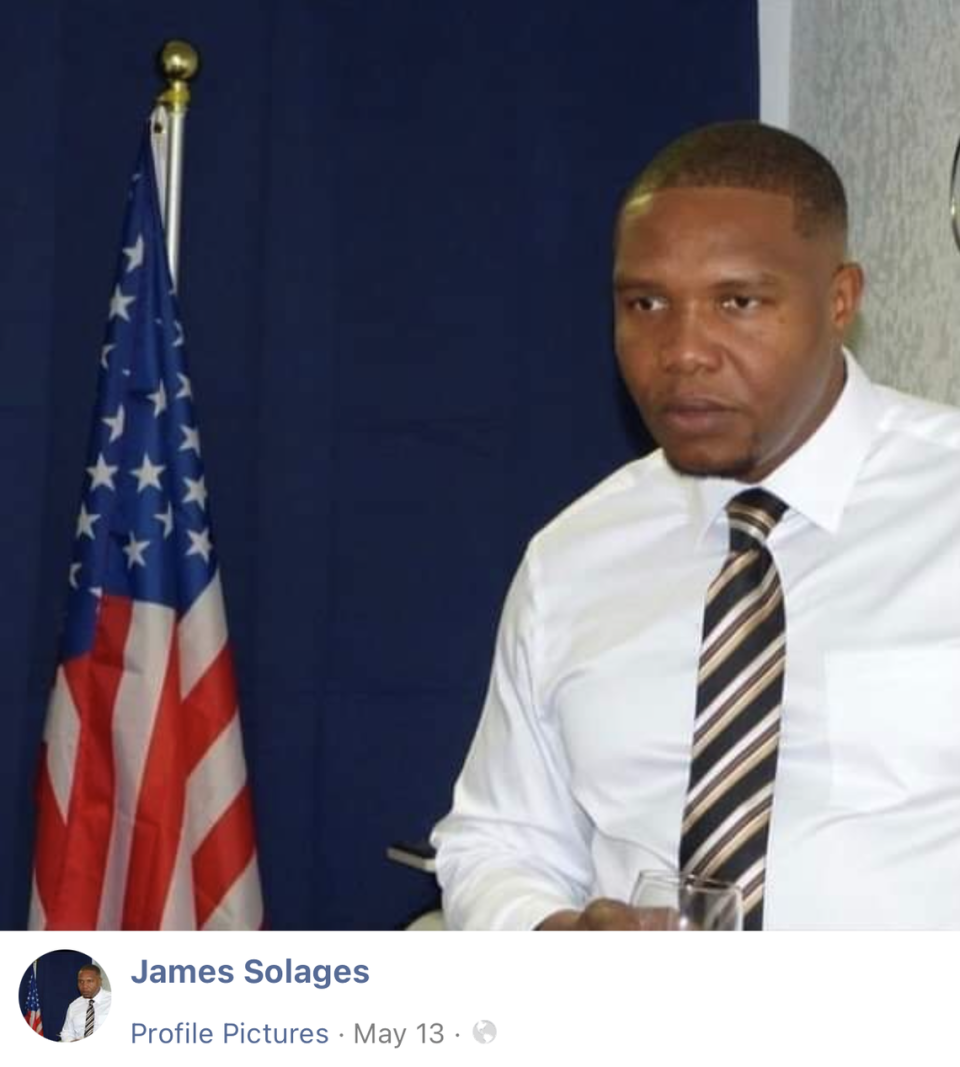Who were the two South Florida men arrested in connection with Moïse assassination?
- Oops!Something went wrong.Please try again later.
Two men with South Florida ties are accused of taking part in the assassination of Haiti’s president. Like much about this week’s shocking murder in the troubled country, mystery shrouds the few details about them.
Haitian authorities on Thursday identified Haitian-American James J. Solages, 35, as one of those captured in the manhunt for the killers of President Jovenel Moïse. They later identified a second Haitian-American man, Vincent Joseph, 55, as well as four Colombian nationals.
In all, there were 28 presumed assassins, Haiti National Police said, noting that 26 are Colombians and only two Haitian Americans. During a press conference late Thursday, the men were brought out to a conference room with journalists, where police singled out Solages and Joseph, and at one point moved them closer to the center of a wall where they were seated on the floor with their hands restrained behind their backs.
Not far from the men were two long tables filled with weapons, machetes, bulletproof vests and cell phones.
It remains unclear why the Haitian government believes Solages and Joseph are involved, how long they’d been in the country, how and when they arrived there or even what their motive was. U.S. officials said they are aware of accusations against U.S. citizens, but could not address the charges with any specifics due to privacy concerns.

Late Thursday, there was confirmation that Solages had once worked for a company that contracted to provide security for the Canadian Embassy in Haiti. It was one of the few details emerging about him.
“We are aware of allegations implicating an individual who was briefly employed as a reserve bodyguard by a security company hired by Global Affairs Canada in 2010,” said a government official, who demanded anonymity because of the volatile situation in Haiti.
Public records show Solages lived in Tamarac and does not have any criminal record. What little legal footprint he has in the United States involves divorce proceedings.
His aunt, Victorie Dorisme, told the Miami Herald that she learned of the accusation from Haitian television and is perplexed how the South Florida maintenance man became a suspected international assassin.
“I’ve never heard of him in any trouble like this,” Dorisme said, adding that Solages had his mail delivered to her address while changing apartments because of his divorce. She said he divided his time between his job as a building maintenance man and running a small charity.
Multiple news reports said Solages described himself on his charity website as a former bodyguard for the Canadian Embassy in Hait — an embellishment somewhat confirmed Thursday night. That website appears to have stopped working, and calls and emails to the charity were not returned.
Solages has an established South Florida footprint on social media. His Facebook page, now taken down, said he attended Fort Lauderdale High School, and based on his date of birth on Aug. 19, 1985, he would have been there in the early 2000s.
His social media page said that between 2015 and 2018 he went on to study at Atlantic Technical College in Coconut Creek and later Florida Career College, where he says he got an associate degree in Information Technology.
Solages’ Facebook page said he is originally from Jacmel, a port town on Haiti’s southern coast. He had a Florida-registered business called FWA SA A JACMEL AVAN INC, which on his LinkedIn page he describes as an economic empowerment charity.
Florida corporate records also show he has a business with two other Haitian men, who are also affiliated with the charity, called EJS Maintenance & Repair LLC. It was opened in the record books in April 2010, and its most recent annual report was filed on May 1. His LinkedIn page calls him the CEO of the remodeling company and lists a start date of 2011.
The question of how Solages earned a living before this week is confounding.
“Experienced building engineer specialize in infrastructure, Equipment, HAVC, Painting with a demonstrated history of working in the hospital & health care industry,” he said in the About section of his LinkedIn page that describes himself. “Skilled in Customer Service, Strategic Planning, budgeting, Team Building, Leadership, Public Speaking, and Training.”
His Facebook page showed that nearly a decade ago, he did some modeling work. More recently it showed him wearing a dapper business suit, and he posted some photos of armored vehicles.
Several of the friends with whom he interacted were in the security business, including a private security guard in Tampa who is Haitian but used an English pseudonym. Solages listed Spanish, English, French and Haitian Creole as languages he speaks.
Solages’ LinkedIn page lists him presently as a plant operations manager in Lantana, nearly 40 miles north of Fort Lauderdale, for a company called Senior Lifestyle. That company runs senior communities nationwide, and in Lantana it operates the Carlisle Palm Beach, which describes itself as “an upscale resort-style senior living option.”
Workers there declined to say whether Solages worked there.
Much less is known about Vincent Joseph. Haitian authorities said he lives in or lived in Miami. There is little public footprint on Joseph.
McClatchy Washington Bureau national security correspondent Michael Wilner and Miami Herald reporter Allie Pitchon contributed to this story.

